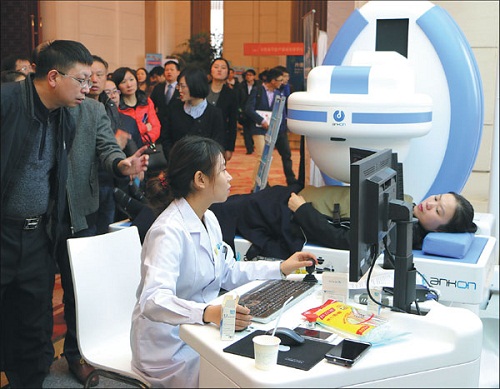Ankon Technology to work with IBM Research
Two companies team up to improve access to gastrointestinal care in remote areas, Wang Hongyi reports from Shanghai.
Shanghai Ankon Technologies recently announced plans to work together with IBM Research to explore the possibility of applying advanced cognitive imaging technology to screening for digestive tract diseases.
One of the world's largest corporate research organizations, IBM Research cooperates in research with partners across many disciplines to address some of the world's biggest medical challenges.
Such a partnership is also Ankon's latest attempt to improve the treatment of digestive diseases, said the company, which is located at Shanghai's Zhangjiang National Innovation Demonstration Zone, home to roughly 80 percent of Shanghai's scientific companies. It works to develop endoscope robots for examining the digestive tract.

SHANGHAI ANKON TECHNOLOGIES, a high-tech company located in the Zhangjiang National Innovation Demonstration Zone, demonstrates how its capsule-like endoscope system works for a patient at an industrial fair. Provided to China Daily
Its product NaviCam, a magnetically-controlled endoscope system used for regular stomach health checks and early stomach tumor screening, won China's Medical Progress Award in March.
Approved by the China Food and Drug Administration in 2013, the capsule-like system weighs less than 5 grams and can be swallowed with water. The patient's condition can then be recorded as it passes through the gastrointestinal tract.
Comprised of more than 300 parts and involving more than 40 international patents, the medical capsule robot combines a plethora of cutting-edge technologies, including sensors, optical imaging, image processing, wireless communications and device packaging.
The robot inside the capsule can take photos automatically as it passes through the gastrointestinal tract. The examination is conducted based on the anatomical structures of the stomach, the developer said.
"The entire gastric examination process can be completed within 15 minutes, and there is no adverse reaction," said Ji Pengsong, president of Ankon.
After the examination, the robot capsule is expelled naturally. Patients need no anesthesia.

 Print
Print Mail
Mail




